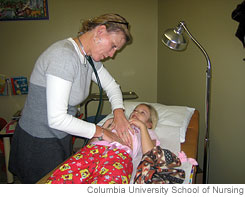- Joined
- Feb 13, 2008
- Messages
- 545
- Reaction score
- 9
To be paid by Medicare at 85% of physician level and 95% in rural areas. 200 Doctor Nurse Programs already established. The AMA is doing absolutely nothing from what I have read. I am starting to believe that physicians especially primary care physicians need to unionize.
http://blogs.wsj.com/health/2008/04/02/say-hello-to-dr-nurse/?mod=WSJBlog
Take a look at the incredibly weak course schedule.
DNP Family Nurse Practitioner Schedule
YEAR 1
FALL
NSG 911 Philosophy of Science 3(3-0)
BIOE 712 Principles of Epidemiology 3(3-0)
NSG 814 Biostatistics3(3-0) TOTAL9(9-0)
SPRING
NSG 916 Concept & Theory Analysis 3(3-0)
HSA 851Leadership and Health Policy 3(3-0)
Nursing Advanced Practice Selective 4(2-2) or required specialty equivalent
TOTAL10(8-2)
YEAR 2
FALL
HSA 877 Health Care Economics 3(3-0)
NSG 819Evaluation of Practice 4(4-0)
NAPS Nursing Advanced Practice Selective 4(2-2) or required specialty equivalent
TOTAL11(9-2)
SPRING
NSG 926 Resident Practicum 6(0-6)
NSG 946 Residency Project3(3-0) TOTAL9(3-6)
TOTAL NUMBER OF HOURS FOR THIS OPTION
39(29-10)
Say Hello to ‘Dr. Nurse'
Posted by Joe Mantone
Nursing schools are making a push to award doctor of nursing degrees, a move that has some physicians and nurses worried, the WSJ's Laura Landro reports.
 Dawn Bucher, a DNP, treats a child patient at Ivanhoe Clinic in Ivanhoe, Minn. Will this confuse the child?More than 200 schools have started or are readying programs, and the National Board of Medical Examiners has agreed to develop a voluntary certification exam to establish a national standard for doctors of nursing practice.
Dawn Bucher, a DNP, treats a child patient at Ivanhoe Clinic in Ivanhoe, Minn. Will this confuse the child?More than 200 schools have started or are readying programs, and the National Board of Medical Examiners has agreed to develop a voluntary certification exam to establish a national standard for doctors of nursing practice.
A fresh supply of well-trained primary care practitioners could help counter a physician shortage.
The goal is to create "hybrid practitioner" who will have more skills and training than a nurse practitioner with a master's degree, Mary Mundinger, dean of New York's Columbia University School of Nursing, tells Landro. She adds that these students are being trained to have more focus than doctors on coordinating care among specialists and health-care settings.
But wait, nurse advocates say, there's a nursing shortage too.
These advocates fear that nurses will be enticed by the higher pay and prestige that comes with advanced degrees and this will make it even harder to find nurses to provide daily bedside care. Some say the doctoral programs are unnecessary.
"Nurse practitioners with master's degrees are already filling the primary care shortages and providing quality, cost-effective care, many times in places that physicians are unwilling to practice," says Wendy Vogel, a nurse practitioner specializing in oncology at Blue Ridge Medical Specialists in Bristol, Tenn.
Also, since these nurses with a doctorate can use "Dr." some physicians worry that patients could become confused. "Nurses with an advanced degree are not the same as doctors who have been to medical school," says Roger Moore, incoming president of the American Society of Anesthesiologists.
http://blogs.wsj.com/health/2008/04/02/say-hello-to-dr-nurse/?mod=WSJBlog
Take a look at the incredibly weak course schedule.
DNP Family Nurse Practitioner Schedule
YEAR 1
FALL
NSG 911 Philosophy of Science 3(3-0)
BIOE 712 Principles of Epidemiology 3(3-0)
NSG 814 Biostatistics3(3-0) TOTAL9(9-0)
SPRING
NSG 916 Concept & Theory Analysis 3(3-0)
HSA 851Leadership and Health Policy 3(3-0)
Nursing Advanced Practice Selective 4(2-2) or required specialty equivalent
TOTAL10(8-2)
YEAR 2
FALL
HSA 877 Health Care Economics 3(3-0)
NSG 819Evaluation of Practice 4(4-0)
NAPS Nursing Advanced Practice Selective 4(2-2) or required specialty equivalent
TOTAL11(9-2)
SPRING
NSG 926 Resident Practicum 6(0-6)
NSG 946 Residency Project3(3-0) TOTAL9(3-6)
TOTAL NUMBER OF HOURS FOR THIS OPTION
39(29-10)
Say Hello to ‘Dr. Nurse'
Posted by Joe Mantone
Nursing schools are making a push to award doctor of nursing degrees, a move that has some physicians and nurses worried, the WSJ's Laura Landro reports.

A fresh supply of well-trained primary care practitioners could help counter a physician shortage.
The goal is to create "hybrid practitioner" who will have more skills and training than a nurse practitioner with a master's degree, Mary Mundinger, dean of New York's Columbia University School of Nursing, tells Landro. She adds that these students are being trained to have more focus than doctors on coordinating care among specialists and health-care settings.
But wait, nurse advocates say, there's a nursing shortage too.
These advocates fear that nurses will be enticed by the higher pay and prestige that comes with advanced degrees and this will make it even harder to find nurses to provide daily bedside care. Some say the doctoral programs are unnecessary.
"Nurse practitioners with master's degrees are already filling the primary care shortages and providing quality, cost-effective care, many times in places that physicians are unwilling to practice," says Wendy Vogel, a nurse practitioner specializing in oncology at Blue Ridge Medical Specialists in Bristol, Tenn.
Also, since these nurses with a doctorate can use "Dr." some physicians worry that patients could become confused. "Nurses with an advanced degree are not the same as doctors who have been to medical school," says Roger Moore, incoming president of the American Society of Anesthesiologists.

